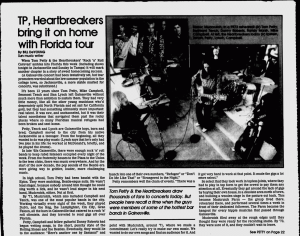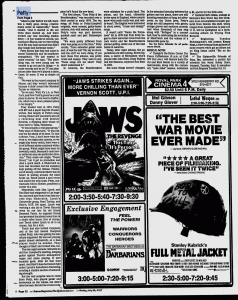TP, Heartbreakers bring it on home with Florida tour
By Bill DeYoung
Gainesville Sun - Friday, July 24, 1987
When Tom Petty & the Heartbreakers' 'Rock 'n' Roll Caravan' ambles into Florida this week (including shows tonight in Jacksonville and Sunday in Tampa) it will mark another chapter in a story of sweet homecoming success.
(A Gainesville concert had been tentatively set, but tour promoters worried about the low summer population in the college town, so Jacksonville, a more stable market for concerts, was substituted.)
It's been 13 years since Tom Petty, Mike Campbell, Benmont Tench and Stan Lynch left Gainesville without much more than ambition to sustain them. They had very little money, like all the other young musicians who'd desperately split North Florida and set sail for California gold, but they had something ultimately more important: real talent. It was raw, and unchanneled, but it was their talent nonetheless that navigated them past the rocky places where so many Floridan musical refugees had been broken and sent home.
Petty, Tench and Lynch are Gainesville boys, born and bred; Campbell moved to the city from his native Jacksonville as a teenager. From the beginning, all they wanted to do is play music (Lynch says that he's only had two jobs in his life: he worked at McDonald's, briefly, and he played the drums).
In late '60s Gainesville, there were enough rock 'n' roll bands to keep rabid listeners occupied each night of the week. From the fraternity houses to the Plaza to the Union to the teen clubs, there was music everywhere. And by the start of the new decade, the pop sounds of the Beatle era were giving way to grittier, louder, more challenging music.
In high school, Tom Petty had been bassist with the Epics. They wore matching, Beatle-esque suits. He wasn't lead singer, because nobody around him thought he could sing worth a lick, and he wasn't singer in his next band, Mudcrutch, either. Not at first.
By '71, Mudcrutch, which also included Campbell and Tench, was one of the most popular bands in the city. Working virtually every night of the week, they played Dub's, and the Keg, the Lamplighter, Cin City, Gran Faloon, all the bars in Gainesville that catered to rock 'n' roll clientele. And they traveled to road gigs all over Florida.
Petty, Campbell and fellow guitarist Danny Roberts had begun writing songs, in the short, punchy style of the Rolling Stones and the Beatles. Eventually, they would lie to the audience: "Here's another one by Santana!" and launch into one of their own numbers, "Refugee" or "Don't Do Me Like That" or "Strangered in the Night."
Petty remembers well the chain of events. "There was a point with Mudcrutch, around '71, where we made a commitment: Let's really try to make our own music. We wanted to do our own songs and find an audience for it. And it got very hard to work at that point. It made the gigs a lot more select."
So select that they took work in topless joints, where they had to play in top form to get the crowd to pay them any attention at all. Eventually they got around the lack of gigs by buying their own house, in a desolate area north of town, and building a wooden stage in the pasture out back. This became Mudcrutch Farm -- the group lived there, rehearsed there, and performed several times a week in front of their dedicated followers. The Farm became the hangout for every hippie musician that passed through Gainesville.
Mudcrutch filed away at the rough edges until they thought they were ready for the recording studio. By '73, they were sure of it, and they couldn't wait to leave.
"About a year before we left, there was a really good, strong, creative music scene in Gainesville," Tench recalls. "And it started to die out when disco started up. And there weren't any real recording studios there -- if you wanted to record, you could go to Macon, but we were trying to be the only band around that didn't play boogie and barbeque music."
Petty denies that they had come to resent Gainesville and its smalltown stranglehold. "We just wanted to make records," he says. "The other thing was, we were young and we wanted to go out and do things -- to make records and be on TV and play places other than we'd played a dozen times. Or more. It was as simple as that.
"We went to the record company in Macon, and they weren't interested because it didn't sound like Marshall Tucker or whatever.
"So we said, 'Well, it's L.A. or New York, and New York's gonna be a cold place to starve.' So we went to California, which was a more pleasant place to be hungry."
They headed west in 1974, Petty with $37 and a paper bag full of sandwiches. Due largely to Petty's songwriting, Mudcrutch was able to secure a recording deal with Shelter Records, a fledging label whose offices were in Tulsa, Oklahoma.
"It was actually a real good group," Petty says of Mudcrutch. "It was just way too far ahead of its time. To coin a phrase. Very... I don't know what the word is, we might play country, or we might play heavy metal, there were a lot of different styles contained within the group. Which might have been its downfall, really. Because it could never settle into any one particular direction." They made one single, "Depot Street," but it got no promotion and died a quick death. A Mudcrutch album was recorded, but the company kept putting off the release. Finally, our of money, convinced there was no future in waiting around, the band broke up. Tench joined a soul revue and toured the west coast. Petty, contractually tied to Shelter, pondered a career as a solo.
Meanwhile, both Stan Lynch and Ron Blair had emigrated to Los Angeles, and each had found even less success than Mudcrutch. Lynch's Gainesville group, Road Turkey, and Blair's, RGF, fell apart. Lynch was working a day job at Tower Records when he ran into his old friend Benmont Tench. An engineer friend had promised the pianist some time in a studio after hours, free of charge, and Tench asked Lynch to sit in on drums. Just for a kick.
Tench had also invited Campbell, and at the last minute Campbell called Petty, who was getting his solo album organized. He was now playing guitar almost exclusively, so a bass player would be needed. They thought of Blair and invited him, too.
The late night sessions rekindled an old fire: Campbell's snarling, stinging guitar against Tench's atmospheric organ and piano playing. It sure sounded good, after all that time apart. And Blair's bass burrowed right under Lynch's ham-fisted drumming, creating a rhythm section of astounding strength.
But the real surprise was to come from Petty, who played guitar and harmonica on the tracks, but didn't take the lead. He told the record company he'd found his new band.
The first album, "Tom Petty & the Heartbreakers," was recorded over a short period in early 1976. The ten songs, all Petty or Petty/Campbell originals, were earnest, guitar-based rockers, rich with melody and sheen. Petty's voice was part dare-me, punkish snarl and part Dylanesque drawl.
"We were pretty different from what was going on at the time," Petty recalls, "from extended guitar solos and...it was the mid '70s, say no more. And the stuff we were doing, if you hear those albums, was pretty crude and snappy. They used to say, 'These songs are too short!' They didn't understand it."
In America, the Heartbreakers were mistaken for a punk band. The album, and the band, ultimately broke open in England, where people knew what punk really was, and really wasn't. The English were interested in short, sweet, "crude and snappy" songs.
It wasn't until "Damn the Torpedoes" hit in 1979 that Tom Petty began to draw universal raves from the rock world, and the Heartbreakers started getting called one of the best bands in America.
Today, after eight albums, the superlatives are still coming. Howie Epstein, a native of Milwaukee who'd played with John Hiatt, Cindy Bullens and Del Shannon, replaced Ron Blair in 1982.
But some things haven't changed. In the extended interplay between the guitar and piano, there are still haunting reminders of long, hot afternoons on the Union lawn. Petty's songs are still peppered with gators, orange groves and southern accents. And when thousands of fans sing along with "Refugee" in a concert hall, they're celebrating the evolution of Mudcrutch and th echoes of a Gainesville gone by.


